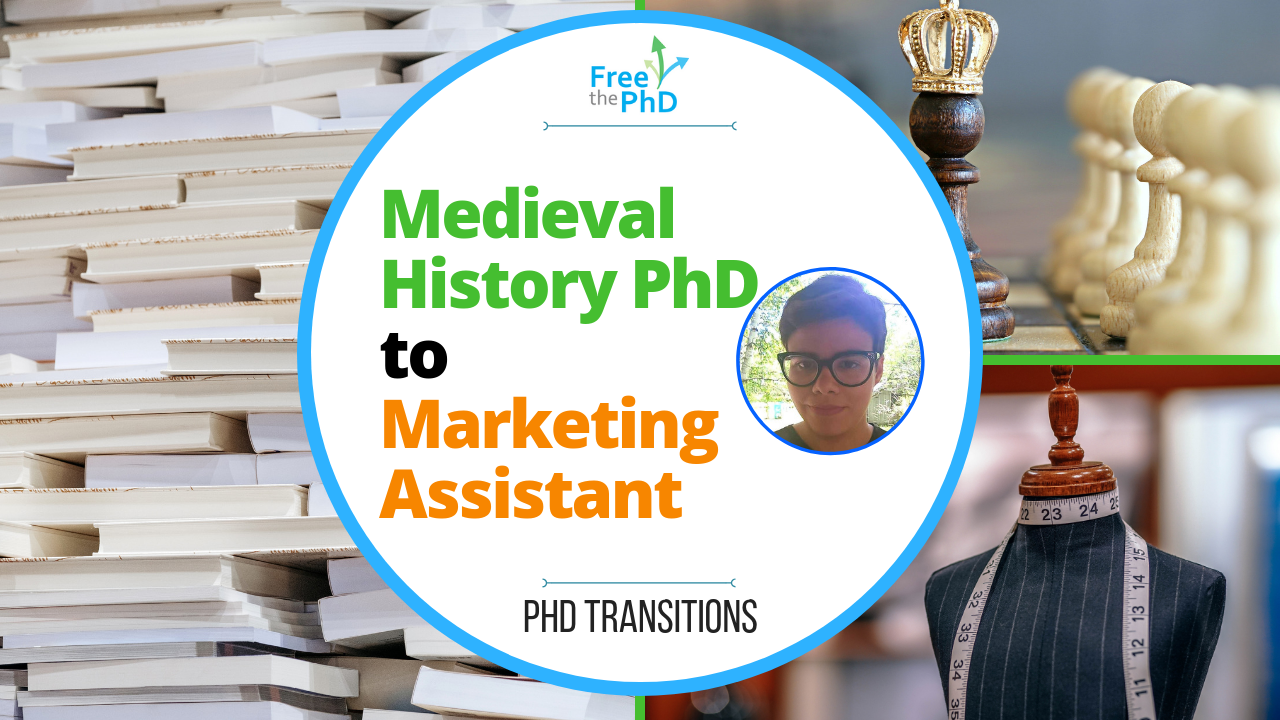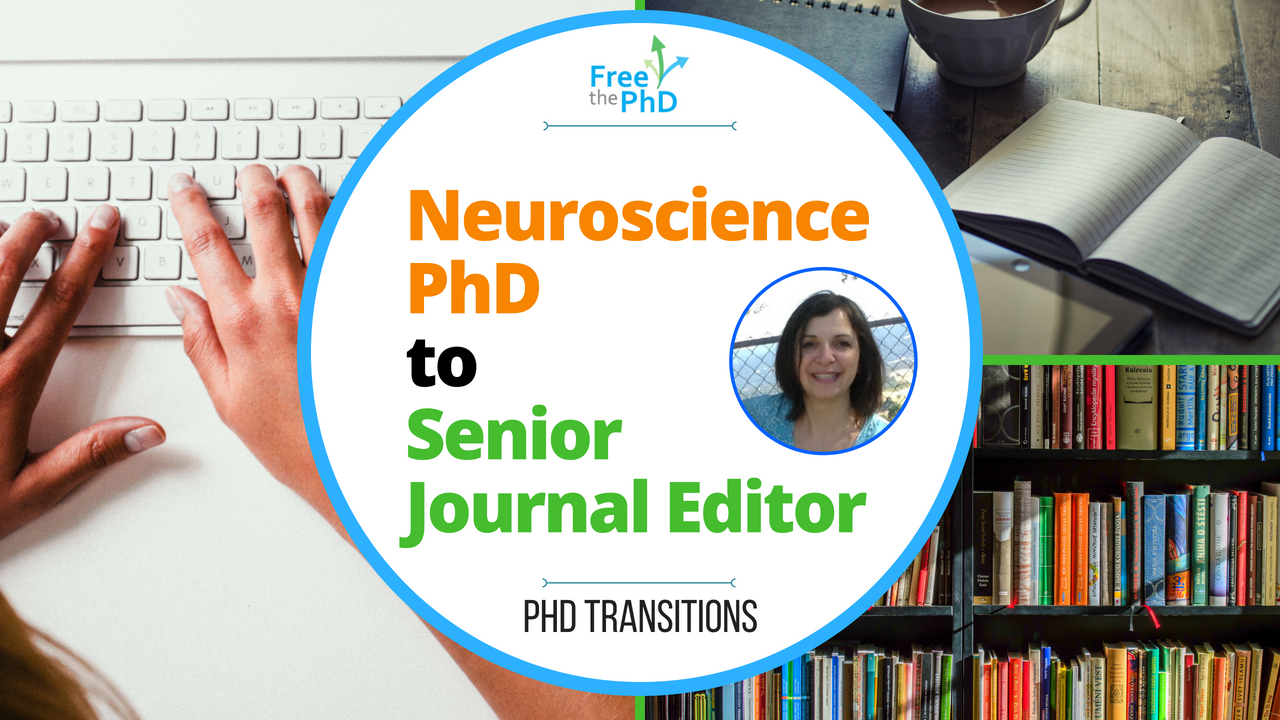From fashion student to history buff to a front-line member of the commercial world (and many roles in-between) – multiple career transitions are common in our day and age and should be expected and prepared for! Let’s check out Dr. Marian Toledo‘s enlightening journey to her current role in marketing at Wilfrid Laurier University Press.
Why did you choose to do a PhD and what did you study?

My transition story is longer than I care to admit, because at its core, it’s the story of two or three career transitions. As an undergrad, I completed a BFA in Fashion Design from the School of Visual Arts of Puerto Rico. I dreamt of becoming a fashion designer and having my own business in New York City; however, that dream took me to London, England where I was accepted into a graduate program in Fashion Studies at Central Saint Martins College of Art and Design.
Having the opportunity to study where fashion greats such as Alexander McQueen, Hussein Chalayan, John Galliano, and Stella McCartney had studied was beyond my wildest dreams. As a twenty-two-year-old from Puerto Rico who had never ventured to the Old World, I took several student loans and embarked on this adventure against everyone’s advice.
Three months later, I regretted my decision.
My first career change was triggered by the incredibly stressful environment that fashion school fostered. I became depressed, lost weight, and was unable to wake up most mornings. Pressured to “look like a fashion designer” at all times, I began to betray my core values to acquire a career in the fashion industry. In my heart, I knew I desperately needed to change course. When I learned that it was possible to do graduate studies in medieval history/studies, I jumped at the chance.

Since I was trained as an artist, I conceived my collections as a conceptual narrative that brought together my interest in the Middle Ages and Scotland. It became clear that while I was still doing my graduate work in London , I was more concerned with the process of research and sketching a collection, which involved going to the library and browsing images for mood boards, than I was about producing clothes. So after being rejected for two masters programs in Fashion, I was accepted to a masters program for Medieval Studies.
I wrote a dissertation on King Malcolm III of Scotland, a subject that has received little scholarly attention. While doing my masters, I discovered how much I loved sharing ideas, research, writing, and learning, and that is when I decided that I wanted to do a PhD. I knew no one had done a historical study on Malcolm III, and I knew that I could fill a historiographical gap by doing a PhD on the subject. I did not begin my PhD immediately after my master’s, however. My father passed away when I was finishing my masters and in December 2010, I was called to work as adjunct faculty in Fashion Design at the School of Visual Arts of Puerto Rico, where I did my undergrad.
I returned home to take care of my family after my father died, working as an adjunct, a museum curator, and occasionally, as a fashion illustration teacher for the general public. Because of this varied professional experience, I thought a career in academia and/or the museum sector would be well suited for me. Once my family was financially stable again, I applied for a PhD at the University of Guelph and moved to Ontario, once again going to a new country without ever having been before.
When did you start thinking about your next steps after the PhD?
I can say that my experience with the PhD was mainly positive. At Guelph, I had an incredibly supportive supervisor and doctoral committee, a very collegial history department, fantastic colleagues, and a very healthy environment. It was contrary to my experience studying fashion in London. But as time went by, and as I transitioned from my twenties into my early thirties, my priorities began to change yet again. One of the things I have learned about my academic experience is that there are surprising similarities between the fashion industry and academia. Both attract hyper-ambitious people, both can foster unhealthy competition and negative self-talk, and both are ruled by an often-silent hierarchical, patriarchal, and unequal system.

I began to feel the pressure to “publish or perish,” which was very similar to the pressure of “you’re as good as your last collection” that is prevalent in the fashion industry. I began to feel intense anxiety, became depressed again, gained weight, and developed panic attacks, which I had never experience before. My teaching practicum did not go as planned; the lecture-style format of the class was very different from the workshop-style of fashion tutorials that I led as an adjunct. I loved working with students one-on-one, which was impossible in a class with 100 students.
I quickly learned that lecturing was not for me. I began developing the same doubts and negative self-talk that I experienced while studying fashion, although this time, I still loved medieval history and I loved my research topic. It was as a result of my teaching practicum experience that I began to reevaluate whether I wanted to remain in academia. Self-doubt, anxiety and depression crept into my brain again, and in April 2016, I had a mysterious bout of gallbladder pain that remained undiagnosed until the next summer. In February 2017, while I was trying to finish my last thesis chapters, I was bedridden with gallbladder pain for 7 weeks; finally, I was diagnosed with a functional GI disorder, which is triggered and worsened by stress.
Needless to say, this bout of poor health made me reevaluate my priorities.

While I loved my profession, it was impacting my health for the worse.
Other factors contributed to my decision to leave academia. The political situation in the United Kingdom after Brexit has made it nearly impossible for foreigners to obtain jobs in Scotland; as a Scottish medievalist, my options to apply for academic jobs were constrained as a result. Furthermore, while there was a considerable number of jobs for medieval historians in the deep South of the United States, I did not feel safe applying for those jobs under the current political climate, even if I am an American citizen by birth.
I never thought that ethnicity, race, and politics would influence my ability to continue in a career or my willingness to apply to certain jobs. I had lacked personal and financial stability in the last ten years of my life, and I craved nothing more but to set roots somewhere. A life of academic endeavours would mean a peripatetic existence until I found a tenured job, if I ever found one. At thirty-one years old, the idea of moving every two to three years in the hopes of getting a job that might not exist did not appeal to me.
I knew it was time to make another career change.
How did you make the transition?
As soon as I knew that academia was not a viable career path for me, I started looking at options. I revised my resume to see what I had experience with and how could I better articulate that experience. I signed onto Twitter and found several free resources, such as From PhD to Life, Jobs on Toast, and The Versatile PhD, that outlined practical steps to begin plotting a Plan B (or, really, a new Plan A).
I did several informational interviews at Guelph’s Library and with colleagues who had moved on to professional careers outside of academia. I received much help from Kris Gies, a Guelph alumnus who now works at the University of Guelph’s Ontario Veterinary College. Kris offered his advice on everything, from Canadian immigration to getting a job in Canada after doing a PhD. He taught me that, from his experience, doing a PhD was not a hindrance to finding meaningful work. As I networked and researched alternative career paths, I discovered how common it was for PhDs to work outside of academia!
Through my search, I identified areas that I was interested working in: university administration, museums, advancement, event planning. I had to think of myself not merely as a researcher, but as a well-rounded professional with specific skills. As I revised my resume, I noticed that my seemingly-disparate professional experience focused on one-to-one customer service, specialized research, and an office or workshop-style working environment. I had experience coordinating events, editing and proofreading, working with social media and graphic design, working with students in high-pressure environments, and collaborating with others. These skills are sought out by employers: the trick here is to get help articulating your experience using non-academic language and connotations.
After my doctoral defense, I began to apply for university administration jobs. Many of the jobs I applied for did not seem like an apparent match for my skills. However, I was invited to interview for jobs in alumni advancement and marketing in publishing. Currently, I am working at Wilfrid Laurier University Press as marketing assistant. The job allows me to use many skills I have acquired throughout the years, such as graphic design, social media management, blog posting, website maintenance, and tons of teamwork. I used many of these skills when I worked as one of the office managers for the Guelph Centre for Scottish Studies. My PhD provided the opportunity to work at the Centre, and in turn, this experience helped me land my post-PhD job.

Therefore, the hardest part about a career transition is to overcome your own prejudices and fears: will I be “wasting my PhD” if I work at a non-academic job? How will my family feel about my decision? What will my supervisor think of me after all of the work I’ve put into a thesis? Those fears are founded on socio-professional expectations, and those are the fears that keep PhDs tied to academic careers that no longer serve them. In the end, I had to think about my health, my needs, and my ability to feed myself.
My advice for people looking to transition to non-academic careers is to be really curious about what makes them tick. What do you really like to do on a day-to-day basis? Do you like working alone or do you prefer collaboration? Do you like an office environment or do you work best in other types of environments? Do you like helping people? If so, how? Do you have any hobbies and what do you like about them? How important is financial security and stability to you? These questions are crucial to begin evaluating your core values and begin investigating which professional paths align with those values.
Ask friends to describe you. Sometimes, we are blind to our own strengths. I did this exercise with several friends and two of them gave me the exact same answer: “you can focus on the big picture while paying attention to the small details.” I used that description in my cover letters.
While there are many free resources out there, sometimes you do need to work with a specialist to help you choose a career path, suggest changes to your resume and cover letter, or guide you towards improving your networking skills. I hired a resume specialist when I was applying for jobs and it was a very wise investment. Her advice was insightful and after incorporating her suggestions into my resume, I got my current job. Be curious, ask for help, and research: this is the advice I have for PhDs looking to transition into fulfilling careers.
By Vay Cao, Ph.D.
If you are a PhD and want personalized, proven advice, guidance and help on identifying and landing your place outside academia, or to get support and guidance on owning your career after your transition, check out the Free the PhD Community at https://freethephd.mn.co .


